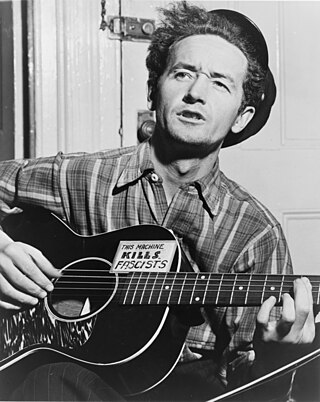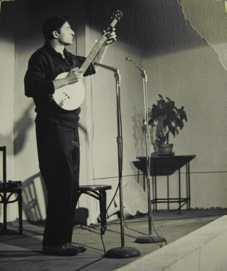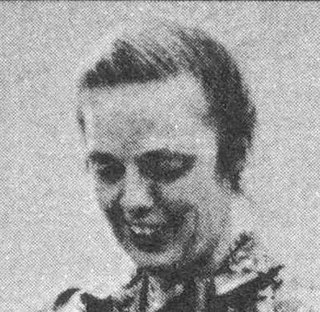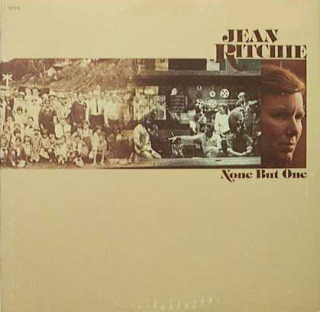Related Research Articles

Peter Seeger was an American folk singer and social activist. He was a fixture on nationwide radio in the 1940s, and had a string of hit records during the early 1950s as a member of The Weavers, notably their recording of Lead Belly's "Goodnight, Irene," which topped the charts for 13 weeks in 1950. Members of the Weavers were blacklisted during the McCarthy Era. In the 1960s, Seeger re-emerged on the public scene as a prominent singer of protest music in support of international disarmament, civil rights, counterculture, workers' rights, and environmental causes.

Burl Icle Ivanhoe Ives was an American musician, singer and actor with a career that spanned more than six decades.

Ribaldry or blue comedy is humorous entertainment that ranges from bordering on indelicacy to indecency. Blue comedy is also referred to as "bawdiness" or being "bawdy". Like any humour, ribaldry may be read as conventional or subversive. Ribaldry typically depends on a shared background of sexual conventions and values, and its comedy generally depends on seeing those conventions broken.
Edward Potts McCurdy was an American folk singer and songwriter. His most well-known song was the anti-war "Last Night I Had the Strangest Dream", written in 1950.

Jean Ruth Ritchie was an American folk singer, songwriter, and Appalachian dulcimer player, called by some the "Mother of Folk". In her youth she learned hundreds of folk songs in the traditional way, many of which were Appalachian variants of centuries old British and Irish songs, including dozens of Child Ballads. In adulthood, she shared these songs with wide audiences, as well as writing some of her own songs using traditional foundations.
Eric Weissberg was an American singer, banjo player, and multi-instrumentalist, whose most commercially successful recording was his banjo solo in "Dueling Banjos", featured as the theme of the film Deliverance (1972) and released as a single that reached number 2 in the United States and Canada in 1973.
Allan Thomas Paley was an American guitarist, banjo and fiddle player. He was best known for his work with the New Lost City Ramblers in the 1950s and 1960s.

The American folk music revival began during the 1940s and peaked in popularity in the mid-1960s. Its roots went earlier, and performers like Josh White, Burl Ives, Woody Guthrie, Lead Belly, Big Bill Broonzy, Richard Dyer-Bennet, Oscar Brand, Jean Ritchie, John Jacob Niles, Susan Reed, Paul Robeson, Bessie Smith, Ma Rainey and Cisco Houston had enjoyed a limited general popularity in the 1930s and 1940s. The revival brought forward styles of American folk music that had in earlier times contributed to the development of country and western, blues, jazz, and rock and roll music.

Fleming Brown, born in Marshall, Missouri, United States, was an American banjo player and one of the early teachers at Chicago's Old Town School of Folk Music. As an artist, Brown specialized in traditional songs of the Southern Appalachians. He was influenced by old-time banjo players such as Uncle Dave Macon and Dock Boggs. Brown supported himself as a graphic artist and as such never performed widely outside of Chicago.

Bess Lomax Hawes was an American folk musician, folklorist, and researcher. She was the daughter of John Avery Lomax and Bess Bauman-Brown Lomax, and the sister of Alan Lomax and John Lomax Jr.

Oscar Brand was a Canadian-born American folk singer-songwriter, radio host, and author. In his career, spanning 70 years, he composed at least 300 songs and released nearly 100 albums, among them Canadian and American patriotic songs. Brand's music ran the gamut from novelty songs to serious social commentary and spanned a number of genres.
Oscar Brand was a Canadian-born American folk singer-songwriter, radio host, and author. He released nearly 100 albums and composed hundreds of songs, among them Canadian patriotic songs, songs of the U.S. Armed Forces, sea shanties, presidential campaign songs over the years, and songs of protest. His discography is extensive.
The Ian Campbell Folk Group were one of the most popular and respected folk groups of the British folk revival of the 1960s. The group made many appearances on radio, television, and at national and international venues and festivals. They performed a mixture of British traditional folk music and new material, including compositions by Campbell. Much of their popularity flowed from the variety of their performance which included a mixture of solos, group vocals and instrumentals.
Billy Faier was an American banjo player and folk music evangelist. He, along with Pete Seeger, was one of the early exponents of the banjo during the mid-20th-century American folk music revival.
Jerry Silverman is an American folksinger, guitar teacher and author of music books. He has had over 200 books published, which have sold in the millions, including folk song collections, anthologies and method books for the guitar, banjo and fiddle. He has taught guitar to hundreds of students. He has presented concerts and lectures at schools, universities and concert halls in the U.S. and abroad.
John Barrett Hasted was a British physicist and folk musician. He was born in Woodbridge, Suffolk, on 17 February 1921, the son of John Ord Cobbold Hasted and Phyllis Barrett. He was a pioneer of radar development and an atomic physicist, but he was also a pioneer and mainstay of the post-war English folk music revival, a founder and champion of the skiffle movement, and a passionate advocate for both traditional and political folksong.

William Currie Watson is an American singer-songwriter, guitarist, banjo player, actor and founding member of Old Crow Medicine Show. His debut solo album Folk Singer, Vol. I, was released in May 2014; its follow-up Folksinger, Vol. 2 was released September 15, 2017 on Acony Records. He has appeared at the Newport Folk Festival and other major music festivals. He currently resides in the Woodland Hills district of Los Angeles.
Frederick Douglass Kirkpatrick (1933–1986) was an African-American musician, civil rights activist, and minister from Haynesville, Louisiana. In late 1964 he was a co-founder of the Deacons for Defense and Justice, an armed black self-defense group, in the small industrial mill town of Jonesboro, Louisiana, to protect the black community against white violence. Together with Earnest "Chilly Willy" Thomas, Kirkpatrick also founded Deacons chapters in other cities of Louisiana, and in Mississippi and Alabama.

Dan Russo was an American violinist, songwriter, and big band leader during the 1920s and 1930s.

None but One is a studio album released by American singer Jean Ritchie in 1977 on Sire LP record SA-7530. The album was a stylistic departure for Ritchie in that it featured "modern" instruments and production values. It resulted in significant critical acclaim, but the album suffered serious distribution problems. A song from the album, "Now is the Cool of the Day" became an anthem for environmentalists opposed to mountaintop removal.
References
- 1 2 3 "Sominico, Sear Dancer, Folk Singer at WSC". The Winona Daily News. 24 June 1961.
- 1 2 3 4 Kandell, Leslie (30 April 2000). "Playing the Banjo With Higher Aims". The New York Times.
- ↑ Wilson, John S (19 April 1985). "40 YEARS OF SONG BY BRAND". The New York Times.
- ↑ "Reviews of New Pop Albums". Billboard. 30 June 1958.
- ↑ "Catalog Releases". Smithsonian Folk Ways Recordings.
- ↑ Nayyar, Seema (13 July 1990). "Dave Sear Strums Songs in the Key of Life". Newsday Nassau.
- 1 2 "Collection Title: Dave Sear Collection, 1959-1996". University of North Carolina.
- 1 2 Ommerman, Betty (29 July 1990). "Folk Songs Are His Language". Newsday Nassau.
- ↑ "South Mountain Slates First Concerts Wednesday". The Morning Union. 16 July 1962.
- ↑ "Across the Country". The Journal News. 2 November 2002.